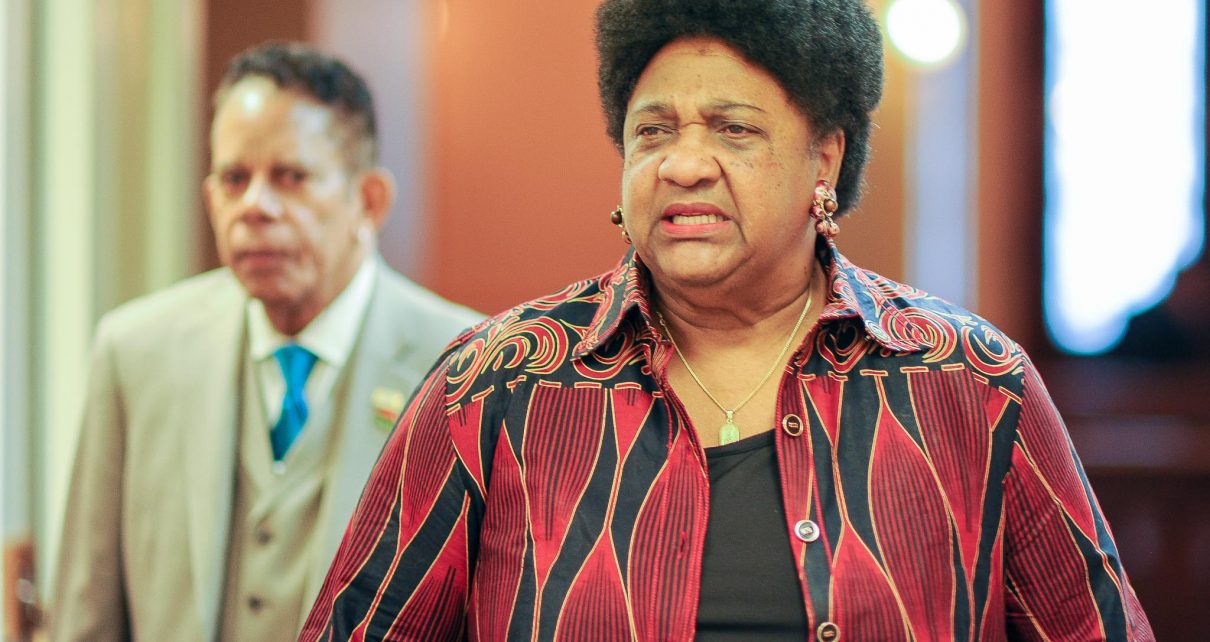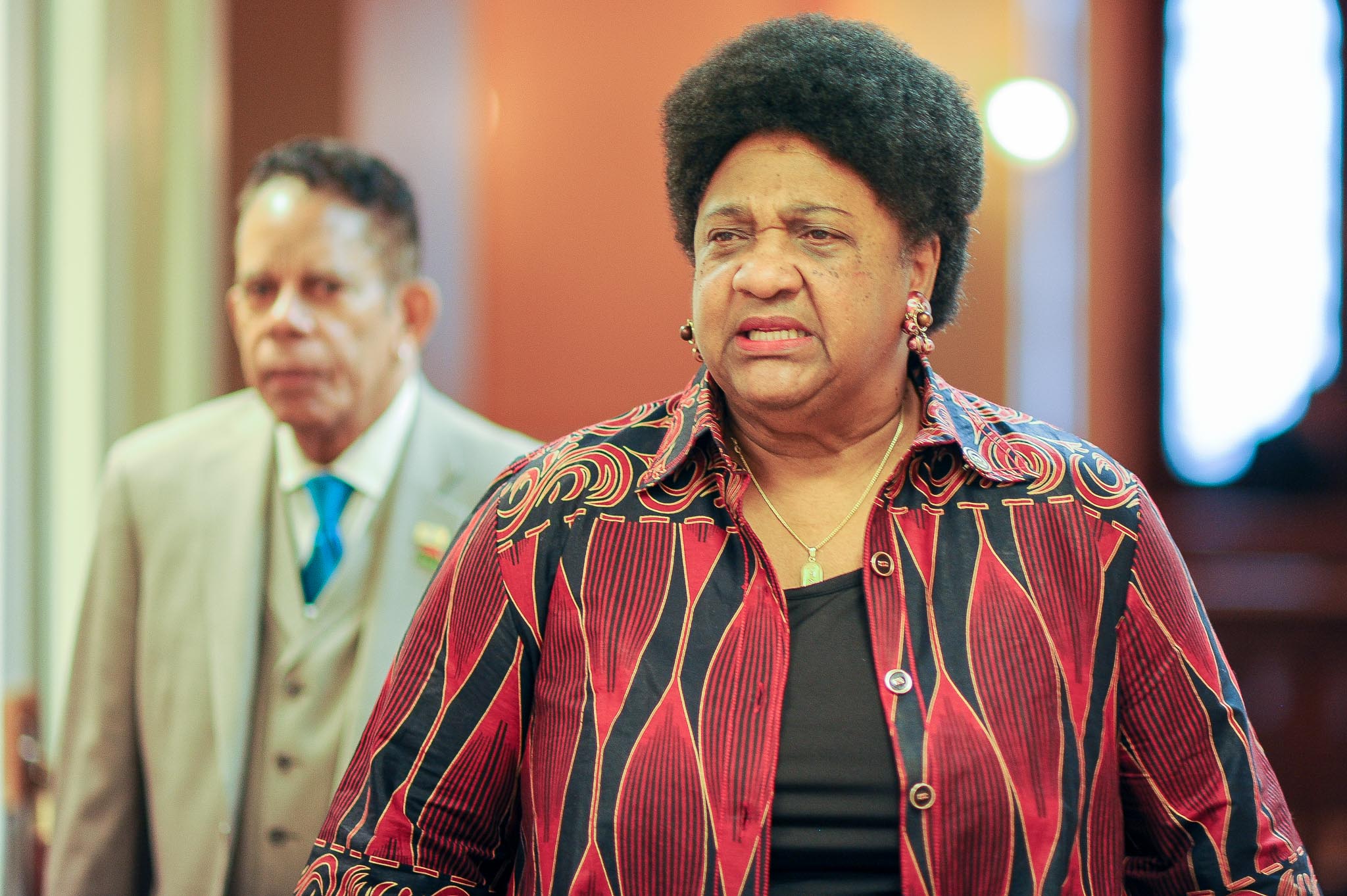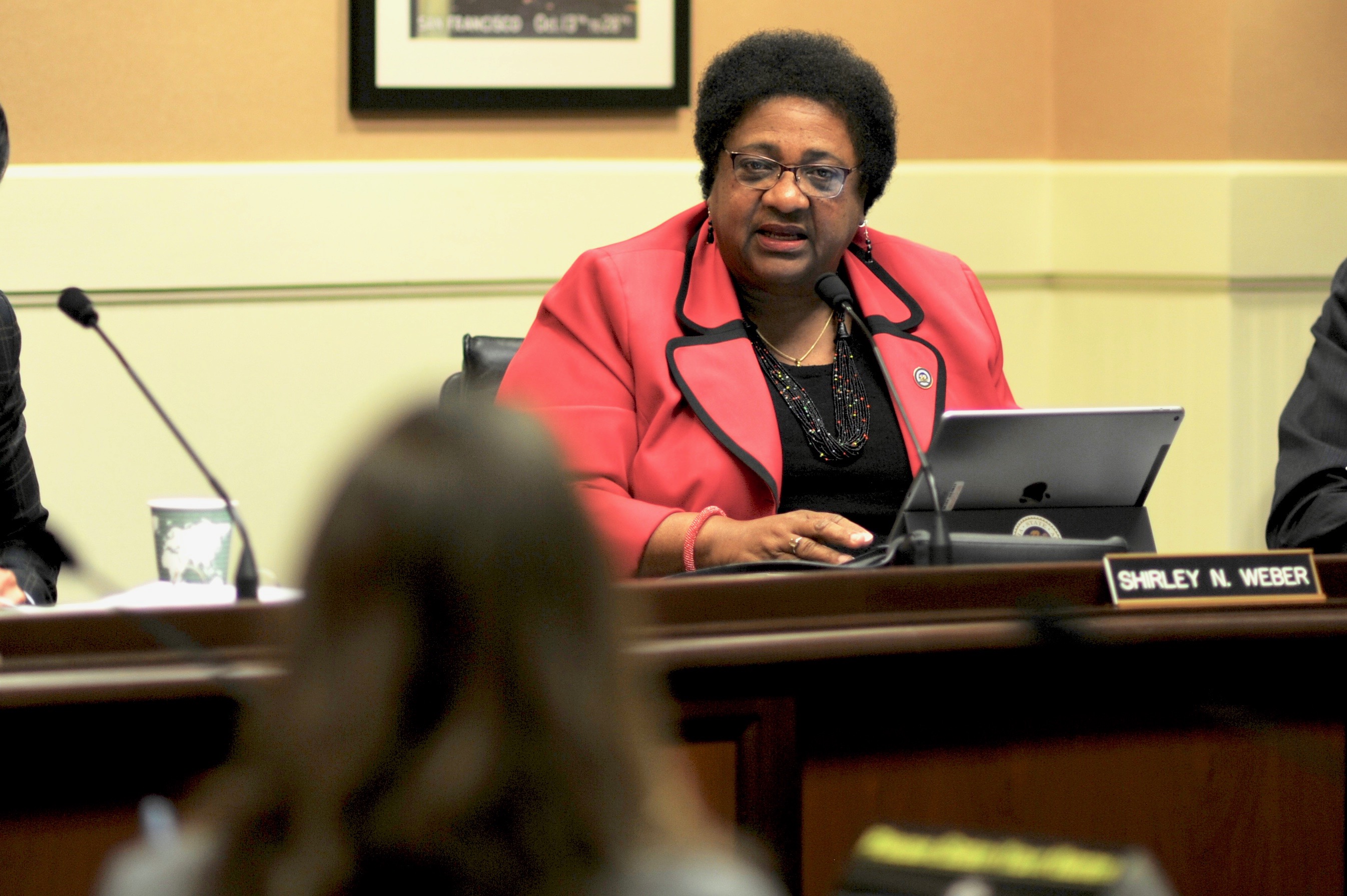
CA Reparations Panel Votes 5-4 to Limit Payouts Only to Descendants of Slaves
The Task Force has still not delved into the actual recommendations
By Evan Symon, March 30, 2022 12:49 pm
The Reparations Task Force voted 5-4 on Tuesday to limit proposed state reparations to only those descended from free and enslaved black Americans in the 19th century, rejecting broader limits of all black residents regardless of ancestry and finally ending debate on one of the most debated parts of the proposal.
The Reparations Task Force was created in 2020 when AB 3121 by then-Assemblywoman Shirley Weber, was passed and signed into law. The bill established the “Task Force to Study and Develop Reparation Proposals for African Americans,” with the task force charged with documenting and looking into issues surrounding slavery in California, including denying free and runaway blacks into the state pre-1865. Most critically, the task force is to issue recommendations if any kind of reparations are to be given. Specifically, the task force, comprised of 9 members selected by the Governor, Assembly, and Senate, is also to set parameters on who would be eligible for possible reparations and how reparations, most likely thing like home buying assistance, free college tuition, and business grants, would be distributed.
The task force first met in June of 2021 but soon faced a major issue of who receives reparations. Late last year, current-Secretary of State Shirley Weber said that reparations would only be given to direct descendants of slaves. However, other members of the task force have since said that they would want to back a system where all black Californians would be covered in a tier-like system. While descendants of slaves would be at the top of the tier for receiving reparations, other black Californians hurt by “historic and systemic racism” could still receive funds. Last month, the issue became such a dividing point that they had to vote to delay the decision to obtain more information on the matter, and all the associated contention over who should be included for the proposal.
On Tuesday, both sides debated the matter once again in a Zoom meeting, allowing members of the public to give their opinions. Many pushed for a slave and free ancestor proposal as the only proposal to hold up in court, rather than the proposal giving reparations to all black residents regardless of genealogy. Others also said that this approach would be more palatable to opponents who are arguing that reparations should not be given at all given that California was a free state during the Civil War and reparations are not needed over 150 years after the end of slavery in the U.S.
“By focusing on just descendants of enslaved and free African Americans from that period, freed slaves included because of the prejudice and risks they had of being “recaptured” as a slave due to the Fugitive Slave Act, the state makes it much more easier to pass,” Mike Washington told the Globe on Wednesday. Washington is a reparations advocate keeping track of the California process, as well as others, to help aide other reparations movements in other states. “You have all black people in there regardless as victims of the legacy of slavery, it becomes muddled very quickly. We’ve seen that in California just through these debates for a recommendation.”
“Plus, for many, it really is about fairness. When reparations were given to Japanese Americans in 1988 for the internment camps during World War II, it was only given to those that were there. Now, everyone who was enslaved has long since passed, but by giving it to the descendants as past due compensation, like what happened with Bruce’s Beach last year, that’s something people can understand more. ”
A debate over eligibility
However, others continued to push for including all black residents, with many Task Force members arguing that all black residents should be included because of systematic injustices stemming from slavery, including unfair housing practices and limited opportunities for decades after the Civil War. Those pushing for all black residents to be included also said the goal of reparations was to help fix injustices and harm from racism, and that limiting who gets reparations would defeat the purpose. Alienation from some black residents was a concern as well, with some Task Force members spelling out the need to get all 2.6 million black residents behind a reparations plan.
“We need to galvanize the base and that is Black people,” said Task Force member Lisa Holder on Tuesday. “We can’t go into this reparations proposal without having all African Americans in California behind us.”
Pragmatic Task Force members and speakers on Tuesday said that the issue of who was eligible needed to be decided now, as they noted that the Task Force has still not gone into the actual recommendations, and just needed to get past this hurdle to avoid falling behind and missing next years recommendation deadline. Others pointed out that expanded eligibility would create only more problems in setting recommendations.
“Expanding eligibility would create its own fissures and was beyond the purpose of the committee,” Task Force member Kamilah Moore said. “That is going to aggrieve the victims of the institution of slavery, which are the direct descendants of the enslaved people in the United States. It goes against the spirit of the law as written.”
Task Force Vice Chairman Reverend Amos Brown added, “Please, please, please I beg us tonight, take the first step. Are we going to act like we live in a country where there are no political realities, no laws. Are we just going to go through an exercise and end up at the end of the day coming up with no measurable outcomes whatsoever?”
The discussions led the Task Force voting 5-4 in favor of only allowing reparations for the descendants of slaves and free African Americans in America before the 13th Amendment.
“They can now go more into the nitty gritty with the framework of who is eligible being set,” said Washington. “Bigger decisions, like what kind of compensation will be on the table for the ultimate recommendation, are now on the horizon for them. Bigger arguments no doubt too.”
More Reparations Task Force meetings are scheduled for later this year. Task Force recommendations are due next year.
- Man Who Broke Into L.A. Mayor’s Home to Receive Probation, Mandatory Drug Treatment - July 25, 2024
- California National Guard Counterdrug Task Force Seizes nearly $4 Million Worth Of Fentanyl In June Following Ramping Up Of Actions - July 24, 2024
- San Francisco’s Guaranteed Income Programs for Trans People to End - July 24, 2024




This “task force” would be wise to read Professor Jason D. Hill’s book “What Do White Americans Owe Black People? – Racial Justice in the Age of Post-Oppression.” Reparations have already been paid particularly through the Civil Rights Act of 1964, the Voting Rights Act of 1965 and not to mention the Great Society/War on Poverty programs. Furthermore, California was not a “slave” state and chattel slavery was abolished in the 1860s by the Emancipation Proclamation and the 13th Amendment to the United States Constitution.
You’d be wise to read Dr. Clyde Anderson ‘Black Labor, White Wealth’ … The 1964 voting rights act, hasn’t done anything to help Descendants of Slaves in America. I challenge you to name one law, legislation, or bill that specifically addressed the plight of African Americans in let’s say the last 50+ yrs since the voting rights were passed.. not to forget,most current white Americans don’t have lineage in America pre1865 so to keep bringing up the civil war,which your ancestors had no part in is illegitimate and since y’all came AFTER slavery that LITERALLY means your peasant ancestors came here to benefit from what the slaves had already built
Sir, your rant is very incoherent. Just for the record, I happen to be Black for the most part and have European and Native American lineages as well. Reparations would not be applicable to todays Black Americans. How exactly would reparations happen in a manner that is efficient and fair? How could we justly reward actual victims living today who were directly harmed by slavery? If cash payments are made, whose taxes would be used to finance them — would we tax Blacks, too? This is just another scam to perpetuate grievance and entitlement, which will only further tear apart our social fabric and get blacks nowhere.
Please don’t confuse Weber’s emotion-driven proposals with cold, hard FACTS….
My Masek ancestor was not even in the USA during slavery, and my ancestors in Europe may well have been serfs (about the same as slaves)…… This is nothing but the evil Democrats wanting to keep the blacks they made into stooges with their take-over of schools and fake “War On Poverty” (really a war on black family life, with about 60% of black children in homes with no father present) down and dependent.
Another way for Democrats to use my job as a piggy bank or an ATM to get more votes.
Whatever! Corrupt and useless vote-buying idiots.
We are so beyond having had ENOUGH.
You pointless legislators really need to give it a rest.
Shouldn’t I, and all other descendants of Native American tribes be first in line when speaking about White Reparations ???? After all, my ancestors were HERE first, in case someone forgot….
This madness is only the beginning, that’s a guarantee.
I believe reparations should be limited to blacks who were ante-bellum slaves. My great great grandfather lived in Buckingham County, VA. He and his brother served in the 22nd Battalion, Virginia Infantry, in the Army of Northern Virginia. They were poor yeoman farmers who had no slaves. Like everyone else in the CSA, they fought for their state, which was de rigueur for the time. Only my great grandfather and his sister survived the Civil War that devastated the South. The destruction of my ancestors’ family is reparations enough. I refuse to pay into this hoax.
From a practical perspective, who’s going to pay for this? Are they going to use general fund cash or are they going to create a special, reparations tax? Certainly, Hispanics and Asians are going to complain if they are taxed to pay for this, so whom does that leave to pay for this? And how long will it be in effect? If someone moves into the state 10 years from now from Mississippi, will that individual be able to collect his/her reparations? Also, will this be a one-time payment, or will the state continue to pay each succeeding generation?
????people’s reaction to hearing reparations.
But as many have stated where the hell is the money coming from and how much will ca scumbag politicians pocket? If you have a case, take it to court get it from those that harmed you. We the people should not have to pay your grievances. CA politics have evolved into race/gender hustling televangelists.